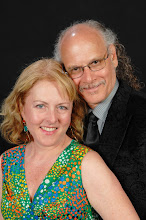Day 3, Part 2: Mr. Firdawsi and the Garden of Ridvan
Baha'u'llah always loved gardens. When He was released from prison and went to live at the Mansion at Bahji, His son 'Abdu'l-Baha rented a beautiful garden with a small house where Baha'u'llah could retreat to spend some time enjoying the natural beauty. He called it the Garden of Ridvan, or Paradise. (Not to be confused with the garden in Baghdad that is commemorated in the Festival of Ridvan.) Here it is.

The fountain was there in Baha'u'llah's day, but instead of being powered by electricity, it was powered by a little donkey walking in circles to supply power to the pump! Peacocks roamed the garden in those days, too. These days their descendents are still there -- kept in a cage to protect them against predators.

When we arrived at the garden, we were greeted by the caretakers, Mr. and Mrs. Firdawsi. They seemed a bit emotional, as did our guide. We soon found out why: They are retiring this week, and we were the last group of pilgrims they would welcome to the garden.
After our guide gave us the general history of the garden and said a prayer, we were permitted to remove our shoes and enter the room where Baha'u'llah stayed. All of the simple yet elegant furnishings were from the time of Baha'u'llah, including His bedding. In common with the other rooms we'd seen, this one was filled with light from many windows. We spent a few moments in prayer, then went back out to look at the gardens.
Unlike the huge gardens on Mount Carmel and at Bahji, this garden is small. It's surrounded on all sides by lush groves of pomegranate and citrus trees, and features the bubbling fountain and a small sitting area in the center. The benches are shaded by huge mulberry trees.
Mr. Firdawsi was very much in evidence, smiling and answering questions in accented but very good English. Here are he and Gary, getting acquainted.

Our guide gathered us together and announced that Mr. Firdawsi is retiring this week after spending his whole life caring for the garden, as had his father before him. Here is the story Mr. Firdawsi told us about his father, the garden, and 'Abdu'l-Baha (at least, here's the story as I was able to reconstruct it from my notes):
`Abdu'l-Bahá was a prisoner in Akka and at Bahji for most of his life. It wasn’t until he was an old man that he was released and permitted to travel the world, teaching about His father. In 1913, after returning from His trip to the
At that time there lived in
Housang did wonderful work in the garden, and `Abdu'l-Bahá was very pleased. So, pleased, in fact, that at the end of the year when Housang asked to go home, `Abdu'l-Bahá said, “No, Housang. I need you to care for the garden.” Reluctantly, because he loved `Abdu'l-Bahá, Housang agreed to stay. He continued to serve loyally, caring for an extensive orchard that included pomegranate trees like this one.
At this point, Mr. Firdawsi paused in his story and said, “This illustrates the two most important things about this story: Obedience and patience.” He continued…
Every year for seven years, Housang asked `Abdu'l-Bahá if he could return toHousang thought about this advice, and next time he asked `Abdu'l-Bahá if he could bring his family to the
Back in those days, the only way to travel from
Housang fell at the feet of `Abdu'l-Bahá and tried to kiss his feet, but `Abdu'l-Bahá wouldn’t let him. He wondered how his family had survived so well, alone in Iran, and discovered `Abdu'l-Bahá had been taking care of the family all that time, sending money to them through the Iranian National Spiritual Assembly.
The family stayed at the garden and prospered. Ultimately the younger son, our friend Mr. Firdawsi, took over for his father as the caretaker. “Now,” he told us, “it is time to leave. I ask the Universal House of Justice if I may retire be cause I am not young. We have obtained papers to move to
For the second time that day, there was not a dry eye in the house. Spontaneously, all the pilgrims lined up and gave Mr. Firdawsi a handshake or a warm hug, and we all promised to pray for him. We did the same to his sweet wife as we left the garden.
Our last glimpse of Mr. Firdawsi was through the entrance to his beloved garden as we drove away. (Double click on the photo to get a larger version.) We will keep him in our prayers, and we will never, ever forget him!




1 Comments:
This story I did not know, and am glad to have heard it. So sweet. Thank you for sharing it.
Post a Comment
<< Home